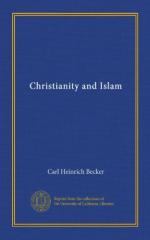Exhortations are frequent ever to remember the fact of death and to repent and bewail past sins. When a mention of the last Judgment occurs in the reading of passages from the Bible or Qoran, the auditors burst into tears. Upon one occasion a man was praying upon the roof of his house and wept so bitterly over his sins, that the tears ran down the waterspout and flooded the rooms below. This hyperbolical statement in a typical life of a saint shows the high value attributed to tears in the East. It is, however, equally a Christian characteristic. The gracious gift of tears was regarded by mediaeval Christianity as the sign of a deeply religious nature. Gregory vii is said to have wept daily at the sacrifice of the Mass and similar accounts are given to the credit of other famous Christians.
While a man should weep for his own sins, he is not to bewail any misfortune or misery which may befall him. In the latter case it is his duty to collect his strength, to resign himself and to praise God even amid his sufferings. Should he lose a dear relative by death, he is not to break out with cries and lamentations like the heathen. Lamentation for the dead is most strictly forbidden in Islam. “We are God’s people and to God we return” says the pious Muslim on receiving the unexpected news of a death. Resignation and patience in these matters is certainly made the subject of eloquent exhortation in the Qoran, but the special developments of tradition betray Christian influence.
Generally speaking, the whole ethical system of the two religions is based upon the contrast between God and the world, though Muhammedan philosophy will recognize no principle beside that of God. As a typical example we may take a sentence from the Spanish bishop Isidor who died in 636: “Good are the intentions directed towards God and bad are those directed to earthly gain or transitory fame.” Any Muhammedan theologian would have subscribed to this statement. On the one hand stress is laid upon motive as giving its value to action. The first sentence in the most famous collection of traditions runs, “Deeds shall be judged by their intentions.” On the other hand is the contrast between God and the world, or as Islam puts it, between the present and the future life. The Christian gains eternal life by following Christ. Imitation of the Master in all things even to the stigmata, is the characteristic feature of mediaeval Christianity. Nor is the whole of the so-called Sunna obedience anything more than the imitation of Muhammed which seeks to repeat the smallest details of his life. The infinite importance attached by Islam to the Sunna seems to me to have originated in Christian influence. The development of it betrays original features, but the fundamental principle is Christian, as all the leading ideas of Islam are Christian, in the sense of the term as paraphrased above. Imitation of Christ in the first instance, attempts to repeat his




